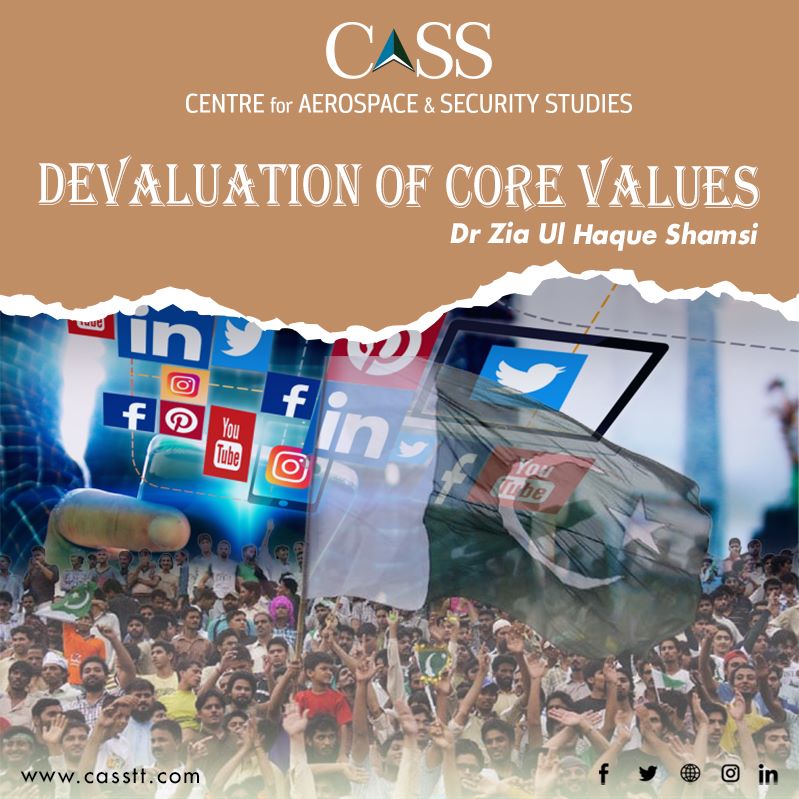There has been a lot of discussion on the devaluation of Pakistan’s currencies over the last year, and rightly so because it has now reached a threatening level where the country might fail to fulfil its obligations and default on its international debts. It is necessary to discuss the economy even if we are not economic experts because the worsening fiscal situation affects the common man the most. However, what is more concerning is that there is no discourse either at the institutional level or among civil society about the devaluation of our core values.
People might question as to what is the significance of this topic at this time when the country is encountering an economic meltdown leading to default, and political polarisation has reached a level where the socio-political structure of the state is facing an existential threat. Perhaps, these subjects may be more compelling at this time, however, I would argue that we must not lose sight of the underlying causes of this morass that we are in at this time.
The historical and Quranic references reveal that nations were annihilated by Allah Almighty, not due to poverty or hunger, but due to degenerated societal values. While non-compliance with Allah’s Direction, and Disobedience to Allah’s Messengers, were the primary causes of the destruction of societies, social ills affecting moral, ethical, and societal values, were also major contributory causes of the destruction of ancient civilisations through natural disasters.
In contemporary times also, the rise and fall of great empires happened primarily due to non-adherences to core values on which those societies had developed and ruled an extended world of their own. The most common of those ills had been the undiminishing lust for power within the elite and the forceful denial of peoples’ right to basic needs for their survival. Romans, Greek, French, Ottomans, and perhaps all of the previous Empires lost control of vast territories they once held, primarily after losing the confidence of the people in their ability to serve.
Moreover, it was not necessary that people always revolted against their rulers whenever injustice was done to them, as in most cases it was an Act of God that not only destroyed the rulers but the entire society.
Religion apart, in most societies, accepted universal values include freedom, liberty, fairness, equality, human rights, social justice, etc. The social contract between the people and the state guarantees each of the above under the constitutional provisions, depending on the system of governance that differs from state to state. However, the just distribution of rights and rightful dispensation of justice may not be possible or practised in all states and all situations. It is this factor that leads to people’s dissatisfaction, and possible reactions.
At 76, Pakistan is at the crossroads of its societal makeup. Well into the third generation since independence, people have matured and become more aware of their rights. Fortunately, the people of Pakistan do not always behave violently, but they do not hesitate in expressing their anger against the ill-willed actions of the state, as and when required. Social media has played a major role in shaping the awareness and opinion of people. At this time, there are over 70 million active social media users in Pakistan, which is nearly 30 per cent of the population. Therefore, it is important to understand that if people are not violent against the abuse of their rights that does not necessarily mean that they are not aware of it.
Unfortunately, certain ills of society have become a norm over the past few decades. For instance, corruption is not considered a very serious matter, and the state is responsible for developing this apathy among the populace. Likewise, injustice towards the relatively poorer segments of society has also become routine at the hands of state institutions. The rising gap in the lifestyles of the rich and poor is also not deemed as unfair or inequitable, though it could become a trigger point when seen in conjunction with other elements.
My fear is that whenever the ills of society reach a certain level without logic, societal behaviour may turn intolerant, and may lead to implosion. This would be extremely dangerous for Pakistan due to its unique societal makeup that is young, socially aware, but economically deprived. Efforts must be made by all stakeholders to avert the devaluation of societal values at such freefall levels, which may lead to an implosion in the short to medium term.
Dr Zia Ul Haque Shamsi is the author of ‘Nuclear Deterrence and Conflict Management Between India and Pakistan’ and ‘South Asia Needs Hybrid Peace.’ He is presently working as Director (Peace and Conflict Studies) at the Centre for Aerospace & Security Studies (CASS), Islamabad, Pakistan. The article was first published in Daily Times. He can be contacted at: [email protected]





